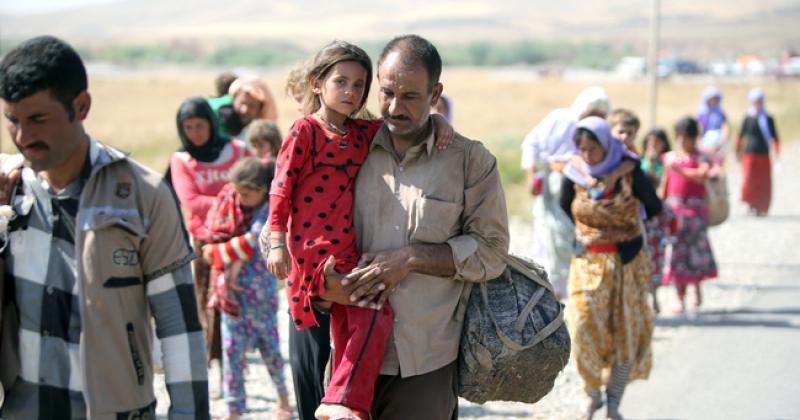Iraq's Yazidi and Christian minorities have made vital contributions to Arab-Islamic civilisation and are integral to the fabric of Iraqi society, intellectuals and artists told Al-Shorfa.
These contributions include preserving the Kurdish language and giving the country some of its key scientific innovations and its most treasured art and literature, they said.
The "Islamic State of Iraq and Syria" (ISIIS) has been persecuting these groups in recent weeks, burning churches in Mosul, forcing thousands of civilians from both communities from their homes and besieging and killing hundreds of Yazidis in Sinjar.
"Christians are sons of this country," Iraqi artist Mahmoud Shubbar told Al-Shorfa, adding that the Yazidis, who are concentrated in Shaikhan and Sinjar, also have made numerous cultural contributions to Iraqi society.
These two groups, along with other religious and ethnic minorities, have made the country "a spectrum of colour, and a texture to which we are accustomed", he said.
Iraq is an ancient nation, said Iraqi poet, writer and former UNESCO media expert Shawqi Abdel Amir, noting that successive civilisations and religions have left their mark on its land and people, transforming it into a cultural mosaic.
Christians were founding members of the Iraqi state, as were the Yazidis, he said.
"Christians of various sectarian affiliations were the real window of openness to science and culture and to the world owing to the tolerance of their religion," Abdel Amir said. "They have contributed to Iraqi civilisation and its cultural, intellectual, artistic and scientific development."
In the Islamic Golden Age, renowned Arab poet Abu Tammam and Hunayn ibn Ishaq, who translated Aristotle's works from Greek to Arabic, were of Christian heritage, he said, and numerous Christians today have contributed to Iraq's contemporary cultural renaissance.
"There are big names in poetry, literature, painting, theatre and theatre direction, and the foremost modern poet is Sargon Boulos," he said.
Yazidis also have given writers, teachers and jurists to Iraq, he said, including Golo Sinjari, who currently serves on the Iraqi Independent High Commission for Human Rights.
"The credit for preserving the Kurdish language goes to the Yazidis," Abdel Amir added.
Artistic and literary heritage
At the beginning of the 20th century, Christian priest Anastas al-Karmali was the foremost Arab author on the subjects of language and history, said Iraqi journalist Waleed Khaddouri.
Dozens of Christian doctors, engineers, artists and intellectuals also enriched modern Iraq, he said, adding that another minority group, the Mandeans, gave the University of Baghdad its second president, Abdul Jabbar Abdullah.
"In sports, we contributed a key football coach, Ammo Baba," he said.
Baba, an Assyrian Christian, scored the first international goal for Iraq in 1957 against Morocco at the 2nd Pan Arab Games in Beirut and later returned to coach the national football team.
"We do not differentiate or distinguish based on the religion of those who are creative and those who are intellectuals, and never did we point our finger at someone as being a Muslim or a Christian," Khaddouri said. "This is a new trend sweeping Iraq."
Iraq's fine arts movement has been active since the 1950s thanks to the poetic, literary and theatrical contributions of Christians from Baghdad, Mosul and Basra, said Babil University dean of arts Fakher Mohammed.
"The names of novelists Sargon Boulos and Jean Demmu and poet Yusuf al-Sayegh are evidence of what [Christians] have contributed to the Iraqi library," while artists such as Ardash Kakafian and Issa Hanna of Mosul have given the country their paintings, Mohammed said.
The Christian presence in Iraq traces its roots back to the Assyrian kingdom and has "remained steadfast", said Iraqi-born Roger Savo, secretary general of the Supreme Council of the Diocese of the Assyrian Church in Beirut.
"The Assyrian civilisation is deeply rooted in the land of Iraq," he said, noting that feats of engineering from this era such as the irrigation systems built to draw water from the Tigris and Euphrates are still in evidence.
"Our history bears witness [to our civilisation] with all that is held in Iraq's museums, including the writings and manuscripts in Assyrian, Akkadian and Aramaic," he said. "It is a legacy that was preserved by all the Islamic conquests, as well as the Sunni and Shia expansions, as each has its own civilisation, culture and legacy."
Mohammed, of Babil University, said he views the current plight of Christians and Yazidis with sorrow.
"Even a week ago, our Christian brothers were refusing to immigrate," the dean said. "They are a big loss to Iraq. I am a Muslim, and I am pained by this disaster as a result of their forced displacement."
There can be no Iraqi state without Muslims, Christians and Yazidis, he said.
"Christians were in the land of Iraq before Muslims," he said. "They contributed substantially to the Iraqi humanitarian and national heritage, and did not do anything to harm Iraq during the political changes that took place over the past 30 years."
